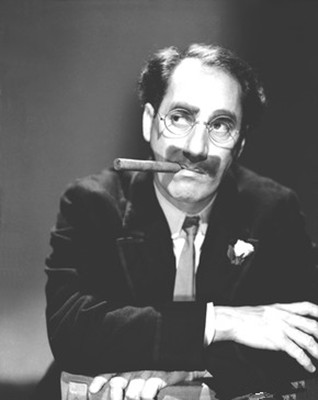(单词翻译:单击)
中英文本
Telling jokes
谈独特玩笑
Have you heard the one…
你有没有听过…
Groucho Marx liked a good one
Groucho Marx喜欢听精彩的
No Joke: Making Jewish Humour.By Ruth Wisse.
不许说笑:犹太式的玩笑
THIS sharp and thoughtful study presents a reviewer with an unusual challenge: which joke do you quote? One cannot tell them all, both because space forbids it and because some of them replicate, in order to mock and render harmless, noxious Jewish stereotypes.
尖锐而又内涵的研究将一个不寻常的挑战放在读者面前:这句玩笑你引自何处?人们通常说不出所有之乎者也来,一方面是篇幅限制,另一方面是很多玩笑是照葫芦画瓢的,用以嘲讽和带恶意的或没有恶意的犹太人的固有看法。

The most telling joke is one that Ruth Wisse, professor of Yiddish literature at Harvard, attributes to Immanuel Olsvanger, a folklorist who was born in Poland in 1888 and who collected Yiddish humour. Here it is, paraphrased. When you tell a joke to a peasant, he laughs three times: once when you tell it, next when you explain it to him and finally when he understands it. The landowner laughs twice: once when you tell it and again when you explain it. The policeman laughs only when you tell it, because he does not let you explain it and so never understands. When you tell a Jew a joke he says, “I've heard it before. And I can tell it better.”
有个讲的最多的笑话是 哈佛希伯来语文学教授Ruth Wisse属于Immanuel Olsvanger ,后者是个搜集希伯来语笑话的民俗学家,于1888年出生于波兰。这里只是转述一下。跟农民讲笑话他会大笑三次,第一次是你给他讲的时候,第二次是你向他解释的时候,最后一次是当他终于听懂的时候。地主会笑两次:你讲的时候还有听你解释的时候。而警察只会在听你讲时候笑一笑,他不会让你解释所以他也不会听懂。但当你跟一个犹太人讲笑话时,他会跟你说“噢,这我以前就听过,我可以讲的更好”。
His joke hinges not just on Jews' fondness for humour, but also on Jewish verbal dexterity, competitiveness and anxiety over social status. But, as Ms Wisse explains, the Jewish reputation for humour is neither universal nor ancient. The connection began with the Enlightenment, but even in the late 19th century London's chief rabbi felt obliged to defend Jews against charges of humourlessness. Jews in Arab countries do not seem to have had the laughing gene, but in the Yiddish-speaking world—and in America and Israel, where many, if not most, Jews descend from Yiddish speakers—the connection between humour and Jews is so strong as to be almost axiomatic. Ms Wisse sees it as similar to “French cuisine” or “Turkish baths”.
他的玩笑不拘泥于犹太式的幽默,更有犹太人的巧舌如簧,和在社会地位上犹太人的竞争力与焦虑感。但Wisse教授解释说,犹太人的幽默感,名声在外,说既不是被普遍接受的也不是有史可溯的。这种形象起源于启蒙时期,但19世纪末的伦敦的犹太教大法师都感到有必要反驳犹太人无幽默感的说法阿拉伯世界的犹太人也不像有笑神经的人,但在希伯来语世界以及美国和以色列,很多犹太人,如果不是绝大多数,犹太人与幽默的联结在希伯来语世界中强大得如同与生俱来,不言自明的一样。Wisse教授把这种怪圈比作“法国烹饪”或者“土耳其浴”一样。
To her credit, Ms Wisse offers no general theory of Jewish humour in her book, preferring description and textual analysis, at which she excels, to psycho-historical puffery. Yet certain traits persist across temporal and geographic boundaries. Jewish humour tends, paradoxically, to provoke both relief and discomfort, as with Heinrich Heine's sharp send-ups of Jewish converts in early 19th-century Germany. Much of it tends towards the absurd: consider the inspiring lunacy of Lenny Bruce, the dark surrealism of Franz Kafka or the comparatively light version that imbues the short fiction of Etgar Keret, an Israeli writer.
出于她信誉的原因,Wisse并没有在书中做出犹太式笑话的概括性的论述,而是在她擅长的历史心理学吹赞方面做了些描述以及逐字逐句的分析。但在一定时间、地理范围内是有确切依据的。犹太式幽默常常是似是而非的,带来轻松或者抒发不悦,就像19世纪初德国的Heinrich Heine对犹太人尖酸嘲讽改变了一样。很多犹太人都偏荒诞:比如鼓舞人心的疯子Lenny Bruce,暗黑超现实主义的Franz Kafka又或者相比之下程度较轻的以色列短片科幻小说作家Etgar Keret。
Jewish humour also rests on a closeness but separateness from the societies in which Jews lived—particularly Yiddish-speaking Jews in Europe—and on paradoxes. “A culture forged in the ancient East that developed in the modern West, and a theology founded in divine election whose adherents have been targeted for genocide—such incongruities tickle the modern Jewish imagination,” explains Ms Wisse. In other words, it is much better to have defiant, life-affirming laughter than tears and lamentation.
犹太式幽默同样依存于一个与他们生活的社会分离的,私密的环境以及种种悖论。Wisse教授解释说,“一个由古老东方孕育在现代西方发展的,他们的神学体系建立在曾经历过大屠杀的后代的牧师选举制之上的文明-诸如此类的不协调启发着当代犹太人的想象力。”也就是反抗着总是好的,生命赋予我们比泪水和哀鸣更多的欢笑。
词语解释
1.in order to 为了
They buy patents in order to sue infringers.
他们购买专利的目的就是为了起诉专利侵权者。
Why does my iphone need so much data in order to assist it in finding my location today?
为什么iPhone需要如此多的数据以帮助定位我的当前位置?
2.attribute to 归结于
The band explored in a variety of sonic directions, something they attribute to eno's encouragement.
乐队探索了众多音乐方向,他们将这归功于制作人eno的鼓励。
Debasement of the coinage was unable to force commercial practice to attribute to the new and lighter coins the same purchasing power as the old and heavier coins.
降低货币的成色不无法迫使商业活动,像接受较重的旧币一样,接受较轻新币,认为它们有同样的购买力。
3.oblige to 对…感谢
Not oblige to their wishes.
不能强迫他们的愿望。
Please don't oblige me to reinstall all again.
请不要迫使我重新安装所有的一次。
4.in other words 换句话说;就是说
In other words, amazon is huge.
换句话说,亚马逊非常庞大。
In other words, he says they are not offering what the consumers want.
他的意思,换言之就是这些日本企业没有提供消费者想要的产品。


